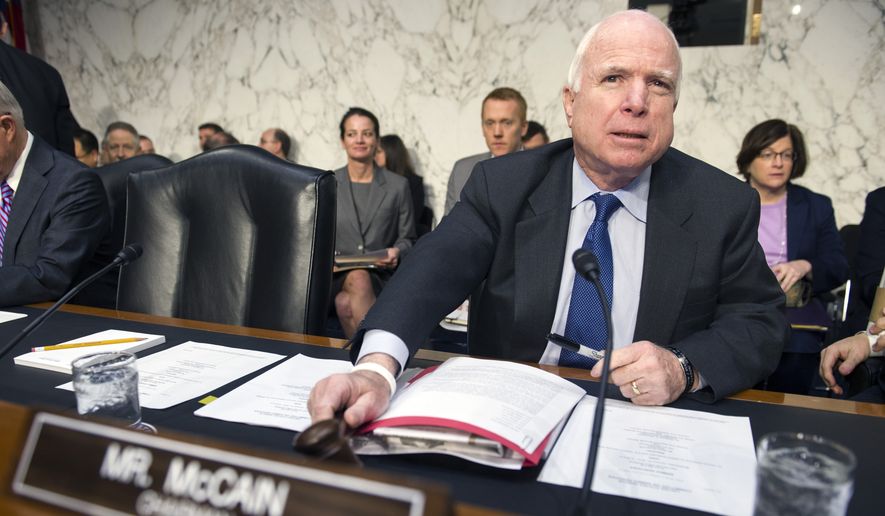Sen. John McCain, the chairman of the powerful Senate Armed Services Committee, plans to ask three of the military’s former top commanders whether U.S. ground forces are needed in Syria, questioning the administration’s approach of limiting U.S. boots on the ground in conflict areas such as the Middle East.
“The President recently proclaimed the success of his limited-footprint counterterrorism approach by pointing to Yemen. Yemen is now in chaos, with the government deposed by Iranian-backed militants and al-Qaeda in the Arabian Peninsula emboldened to facilitate and execute terrorist attacks around the world,” said Mr. McCain, in prepared testimony obtained by the Washington Times in advance of Tuesday’s hearing.
The Arizona Republican also called the president’s strategy a failure in the fight in Iraq and Syria against the Islamic State, also known by the acronyms ISIS and ISIL.
“President Obama has been applying the Yemen model in the fight against ISIL in Iraq and Syria with predictable results,” he said. “The ISIL flag still flies over major cities in Iraq, such as Mosul and Fallujah. In Syria, ISIL has significantly enlarged its territorial control since U.S. strikes began last year. And despite the President’s stated goal of degrading and destroying ISIL, we have no strategy in place to accomplish it.”
Syria has become the focal point of U.S. national security concerns over the past two years, as its civil war and repressive buy unstable government has allowed the state to become a feeding ground for terrorist insurgents like ISIL.
President Obama has authorized airstrikes over Syria and ordered the military to train opposition fighters to beat back Islamist rebels such as ISIL, but he has been reticent to send U.S. ground forces into the country. That decision lawmakers are now beginning to question, especially after Yemen’s government was toppled by Iranian-allied armed militants last week, stripping the U.S. of a loyal ally in its campaign against al Qaeda.
Mr. McCain’s committee will hear testimony from a trio of retired military leaders who have experience juggling complex war plans amid a shrinking defense budget.
Two of the men, retired Marine Corps Gen. James Mattis and retired Adm. William Fallon, managed operations in the Middle East. The third leader, retired Army Gen. John Keane, used to oversee Army operations.
Mr. McCain has been sounding the alarms about pending national security threats over the past month, and aims to use the committee’s hearing as another platform to point out what he percieves to be the administration’s lack of a cogent strategy for the Middle East.
Over the past two days, the Arizona Republican has criticized Mr. Obama for not having a plan to combat Islamist terror in countries where Congress has approved funding for numerous, drone-led counterterrorism missions, such as Iraq, Syria and Yemen.
“Basic strategic questions remain unanswered: Can we successfully defeat ISIL without even small numbers of American ground forces in both Iraq and Syria? Does the President still believe Assad must go, and do we have a strategy to achieve that goal? How will we protect brave Syrians we send back into Syria from Assad’s airpower?” said Mr. McCain in his prepared remarks. “The fact is that President Obama’s delayed and feeble response is not degrading or destroying ISIL, nor is it inspiring confidence among our allies and partners.”
The Washington Times learned Monday evening that the outspoken congressional leader will not be able to attend the hearing due to overseas travel in the Middle East, but his testimony will be read by Sen. Jim Inhofe, Oklahoma Republican, pending any snow cancellations.
In addition to the crisis in Syria, the situation in Yemen will be at the forefront of policymakers and military leaders concerns, said Steve Bucci, a national security analyst for the Heritage Foundation, a conservative think tank based in Washington.
The recent overthrow of the government in Yemen has created “an enormous danger” to U.S. counterterrorism operations, which could be undermined by the new power structure forming in the country, said Mr. Bucci.
For the most part, academics agree with Mr. McCain – a better U.S. strategy needs to be developed and implemented to protect U.S. national security.
The Obama administration needs to develop a comprehensive regional policy if it wants to quash the vast array of threats growing in the Middle East, such as violent protests in Egypt, said Brookings Institution senior fellow Michael O’Hanlon.
“There is no clear guidance or framework for how to handle Egypt, in particular,” Mr. O’Hanlon said. “I would rate it poor in regard to Syria because our level of engagement is not up to the stakes involved in the conflict, and we are losing at present. Also, for states like Yemen and Libya … we are not engaging enough. We need to be more willing to help train regional security forces, among other things.”
The Pentagon is advising and training Iraqi and Syrian opposition fighters to battle back the Islamic State, but training takes time, and the strategy is already ruffling diplomatic feathers in Iraq, where the country’s prime minister has expressed distaste with the slow pace of international assistance.
Analysts are also concerned that more is needed.
“The idea of taking a shopkeeper from Damascus and training them into hardcore killers that can fight ISIS – that’s going to take some time,” said Mr. Bucci, a former special forces colonel who has spent decades serving in the military.
• Maggie Ybarra can be reached at mybarra@washingtontimes.com.




Please read our comment policy before commenting.